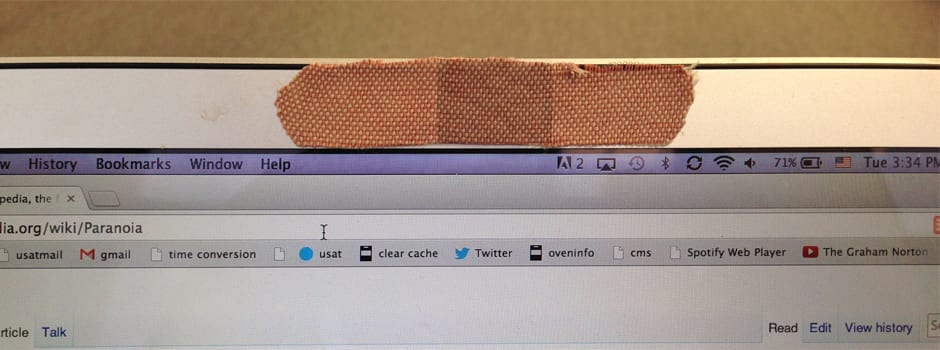Paranoid or Prudent: Should You Tape Over Your Webcam?
Does your webcam need a tinfoil hat of its own?
 Credit:
Credit:
Products are chosen independently by our editors. Purchases made through our links may earn us a commission.
If you're one of those people who gets made fun of for putting a piece of tape over your webcam, don't worry—you're not crazy. Unfortunately, your paranoia is justified, since it is, in fact, possible for the internet's n'er-do-wells to secretly seize power of your computer's forward-facing camera.
Webcam spying came to headline news earlier this year when news broke of a "sextortion" situation in which Miss Teen USA was surreptitiously photographed au naturale by a remotely-hacked webcam. Ostensibly, the hacker infected the pageant winner's computer with spyware, using remote access tools to secretly enable the webcam.
The hacker and the beauty queen both attended the same high school, which theoretically provided him with physical access to her computer. But more troublingly, he had also planted the spyware on the systems of strangers across the country, proving that proximity isn't required to infiltrate someone's system.
But while hacking using trojan horse viruses is the most malicious way to infiltrate a system, shifty websites sometimes use basic techniques that take advantage of human behavior patterns. Clickjacking is one of the simplest ways hackers can seize power over a webcam.
When a user sees a button that appears to close an ad, it can be assumed that they'll click on it. Knowing this, clickjackers create an invisible button over that area, connected to a script that activates the camera. You know how your browser asks if it can have permission to use your webcam and audio? Well, imagine that dialog screen is invisible and the "yes" button is placed directly over the spot you'd click. Another simple script can turn disable the webcam light so you have no clue that the thing is even turned on.
But it's not just predators and extortionists who take advantage of these loopholes. While the government's occasional use of webcams for spying purposes isn't a surprise to anyone who's been paying attention to the news, more benign public institutions have also dabbled in the practice.
A few years ago, one school's policy of remotely activating webcams came to a very public head when parents and students complained of privacy violations. The school's agenda claimed not to be Orwellian—the remote activation's sole stated purpose was the recovery of missing laptops—but one student received a notice that he had engaged in "improper behavior" with webcam video footage cited as evidence. This did not go over well.
Though you never know if you're truly safe from hackers, keeping your browsers and antivirus software up to date is the first step in a solid defense. Furthermore, you can take advantage of plugins in browsers like Google Chrome that disable scripts you don't want and keep you informed of your computer's interactions with the websites you visit.
So should you put a sticky note over the camera? Well, maybe. A paper cover won't do anything to block the microphone, but it'll certainly block the camera. If you don't find yourself video-chatting too often, it might be a step worth taking. But if you're really concerned about privacy, a multi-pronged defense is the best course of action. Avoid sketchy sites, tape over your webcam, keep your software up to date, and obey the golden rule: compute while clothed.
